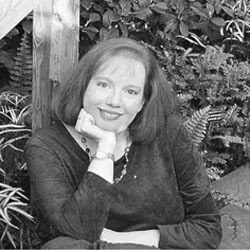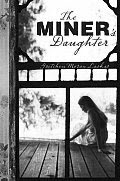Author Gretchen Laskas caused quite a stir at the WV Book Festival several weeks ago in Charleston, where she discussed her newly published second book, "The Miner’s Daughter." We decided to find out what all the fuss is about, and ask her a bit about she’s up to in this young adult novel.

Esther French: You wrote another novel, "The Midwife's Tale," which was also set in West Virginia. Did you intend any connections between the books or any parallels in the stories?
The first rough drafts of each were written around the same time, but other than some of the crossover in terms of timeline and the research I was doing, the two novels don’t share many parallels. I speak briefly of coal towns in The Midwife’s Tale and use a little bit of my midwifery history knowledge in The Miner’s Daughter, but each is, to my mind, its own story.
EF: You call your grandmother "a true miner’s daughter," and your father was born in Arthurdale, the town where Willa’s family eventually settles. How much did your family history influence you when writing this book?
I don’t deny that family history influences my writing – I’m the oldest child of the oldest child of the oldest child of the oldest child. Far more of my extended family was living when I was growing up than not, an unusual situation in today’s world. I came from one of these sprawling, kin-filled worlds where we might argue amongst ourselves, but we could come together at the drop of a hat. This sense of solidarity and on-going communal storytelling definitely influences the work, although interestingly enough, this doesn’t mean the individual stories I tell are based on family ones. My family was not part of the original settlement in Arthurdale, although my family has been part of the community since 1943. But I certainly wouldn’t be a writer without the eight generation of West Virginians that came before me, and I owe a lot to both of my grandmothers in particular.
EF: The Depression is a key piece of the setting, and a major challenge for Willa’s family is keeping together through the tough times. How were your grandparents affected by the Depression?
No one has ever asked me this question, so I hadn’t thought about it, but it’s a good one for the novel. My grandparents had very different experiences of The Great Depression, all of which are in the novel.
My paternal grandparents were among those who like Willa, were more isolated and connected to the coal camps. But each family owned or was able to rent a little bit of land, which made food production easier. We see this in The Miner’s Daughter in references to the farm work the Lowells are able to do, as well as Mama’s ability to can and make the most of all food brought their way. The family is tied to the coal industry, but they came to the camps with more than one skill, which helps them in the selection for Arthurdale.
My maternal grandparents (who are Wayne and Ginny, the couple Willa meets in Fairmont) had very difference experiences. Growing up in the city, without a garden, husbandry or the skill sets of more rural areas, my grandmother experienced real hunger. At school, more affluent students’ dress made her own lack of clothing all the more apparent. Both of these emotions run through the novel: Willa’s black and white dress is taken from an actual blouse my grandmother made at this time, which I now own.
And my maternal grandfather had a life virtually untouched by the Great Depression. The family owned a home on Country Club Road; he had a car, a good job as an accountant, and enjoyed roaming around the country with “the fellows” attending college football games. My grandparents’ wedding video (imagine, a wedding video in the 1930’s!) was lost when the camera it had been taken on was stolen at the Army/Navy game. This is, of course, the world of Grace McCartney and her family.
EF: Willa’s discovery of poetry marks a new stage in her life. What was the awakening moment for you as a writer?
There wasn’t only one, but I remember keenly each and every person who believed in me. My seventh grade English teacher was the teacher I had who thought I’d grow up to be a writer. She taught me the poetry that Willa learns in the novel. I also had an outstanding middle school librarian, who made sure I read all the books to prepare me for life, no matter what choices I decided to make. Such small, everyday actions by adults can have large impact in a younger person, and I take them very seriously, now that I’m the adult.
EF: Willa struggles against government officials who are prejudiced against Americans who do not fit into the “white, native-born, and Protestant” mold. Do you see any parallels between the nativist ideas in Willa’s world and the anti-immigration movement of today?
There are parallels, and they are, to my mind, rather obvious ones. But what I find interesting is how little effort creatively on my part was required to draw them. Simply writing the words that were used at that time made comparisons to “the good old days” stand out. There were people I knew growing up who were prejudiced towards families that came from recently non-English speaking backgrounds such as Italian or Polish, and that was a full generation later. Of course, growing up in Pittsburgh, where it seems EVERYONE is from such a background, I longed for my own Ellis Island story. In that regard I “married in” – my husband is only two generations removed from Europe; none of his grandparents spoke English as their first language.
 EF: You mentioned the Appalachian Writers Workshop in your acknowledgements. How did the workshop help you more clearly imagine the coal company town of Riley Mines?
EF: You mentioned the Appalachian Writers Workshop in your acknowledgements. How did the workshop help you more clearly imagine the coal company town of Riley Mines?
The Appalachian Writers Workshop is a wonderful regional resource. I know of few other conferences anywhere in the country that bring such talented and professional writers together every summer in a setting that is energizing to any writer who takes her work seriously. Several people in particular from that conference have encouraged and strengthened me as a writer; you certainly need talent in this business, but in order to survive the process of writing and then publication, you need what might be called gumption (half courage, half a kick in the pants), and the Workshop gives you that a hundred times over.
EF: At one point in the book, Willa comments on the relative value of money when she says, “If anyone would have told me a month ago I’d be sad about getting only a penny for a treat, I’d have called them crazy.” How would Willa react to modern consumer society?
Good Question. In the Reading Guide, I ask how Willa might feel about our society today. Have we lived up to her hopes of the future? I think we have in some ways, but not in others. This is perhaps the question I hope readers find themselves asking the most. One of the reasons I love writing historical fiction is to ask readers questions like these.
EF: Miss Grace, Willa’s missionary friend, is very supportive of her. What kind of role did churches and missionaries play in 1930s coal towns, especially with regard to education?
Miss Grace has much in common with Mary Behner, a young woman who came to Scott’s Run, West Virginia to teach Sunday School in the 1930’s. She opened a library (of particular interest to me), started the first African-American girl scout troop in the area, and took children who had never left the coal camps to Morgantown to see a little of the world around them. She was one of many who came, and the work they began continues today in many areas of the region.
Eleanor Roosevelt was first alerted to the conditions of the WV coal camps by the Quakers. They had begun trying to revitalize handicrafts as a way for out of work coal miners to earn some money. Eleanor bought one of the chairs – a lovely piece of work that convinced her that anyone who could make a chair like this was well worth trying to help. That was the beginning of what would become Arthurdale.
EF: Willa’s older brother, Ves, wants to help organize labor unions. What shape did the 1930s labor union movement take in southern West Virginia?
In the West Virginia Mine Wars, in southern West Virginia, the Federal government armed itself against its own people and threatened them. And why? For unionizing and fighting for the right for better wages, work safety and fair treatment. To have the federal government turn around in the 1930’s and claim “The President Wants you to Join the Union!” would have been an incredible moment in time, and I understand why Ves and Johnny wanted to be part of that. My family came out of the northern VA coal mine unionization efforts, and my husband’s grandfather was blacklisted in Europe as an organizer, which was how he ended up in the US. My husband also worked for the AFL-CIO and interned with the United Mine Workers during law school. Our sympathies and gratitude for labor run very deep.
EF: When Miss Grace first meets Willa, she mistakes her for a “coal mine girl.” Why does Willa seem slightly offended at this label, when she willingly identifies herself as “a miner’s daughter”?
Believe it or not, my editor and I actually discussed this back and forth a lot. She was in favor of titling the book “Coal Mine Girl” and I was adamantly against it. First, Willa, to my mind, wouldn’t appreciate being called a “girl” after she has grown so much. Also, while the family can leave the mine behind them, we know that the father carries the mine (dust) literally within him. My grandfather stopped mining in the 1950’s, but that didn’t keep black lung from killing him years later. In West Virginia, at some level, we are all “Miner’s Children” no matter how many generations (if any) we are out of the mines themselves.
EF: Your first two books have been set in Appalachia. What’s next for you in your writing?
I’ll come back to West Virginia again – it’s simply too full of stories and characters that are waiting to be written. But I would like to explore some other places in my fiction, especially Pittsburgh, where Appalachian influences play a tiny, but vital, role. Or here in Washington DC, where every third person I meet comes from the region. I’m part of the great Appalachian diaspora, and that is also a side of our history and culture that needs to be told.
Originally interviewed by Esther French at Appalachian History
related post: "author Ted Anthony discusses 'Chasing the Rising Sun'"
Gretchen+Laskas The+Miners+Daughter WV+book+festival West+Virginia+history appalachia +appalachian+culture appalachian+language


